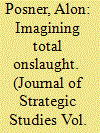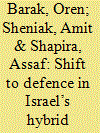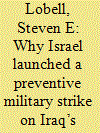| Srl | Item |
| 1 |
ID:
193160


|
|
|
|
|
| Summary/Abstract |
This paper to uncovers how leaders practice emergent strategy as a core strategic philosophy. The article uses the case of general and statesman Moshe Dayan as a principal case study to uncover leadership and management practices of emergent strategy. Following a discussion on the emergent versus deliberate strategy schools, I show why Moshe Dayan as a leader can be considered as an archetype of the emergent approach worth studying. I then present six leadership principles that enabled him to practice the emergent approach. The article concludes with discussion of the limitations and value of the emergent approach for leaders today.
|
|
|
|
|
|
|
|
|
|
|
|
|
|
|
|
| 2 |
ID:
193164


|
|
|
|
|
| Summary/Abstract |
The Apartheid-era South African military (SADF) underwent dramatic peacetime changes, from a small and underfunded expeditionary element of Commonwealth forces in the 1950s to a regime bulwark with regional capabilities under ‘Total Strategy’ in the mid-1970s. By comparing internal assessments, changes in the SADF’s official view of future wars are traced through security crises of the 1960s and 1970s. Shifting future war perceptions were shaped by the interplay of organizational-political needs during crises of legitimacy for the military. These shifts in future war perception motivated strategic and operational-tactical doctrinal change and shaped the military’s view of security crises.
|
|
|
|
|
|
|
|
|
|
|
|
|
|
|
|
| 3 |
ID:
193161


|
|
|
|
|
| Summary/Abstract |
What started as opportunistic operations has gradually given rise to Israel’s prevailing military doctrine of Inter-War Campaigns (IWC). This article provides a comprehensive analysis of a phenomenon that has shaped conflicts in the Middle East, one that has been overlooked in the literature. The IWC utilises advantageous conditions to formulate continuous military campaigns below the threshold of severe conflict. This article argues that the IWC creates and manages limited competitive conflicts intended to mitigate adversaries’ force buildup in preparation for war. It provides the first account of the doctrine’s development, analyses its enabling factors, and discusses its degree of success.
|
|
|
|
|
|
|
|
|
|
|
|
|
|
|
|
| 4 |
ID:
193165


|
|
|
|
|
| Summary/Abstract |
This article examines the strategic decision-making of the South African regime between 1975 and 1989. Existing scholarship argues that Pretoria was a regional hegemon and that this position underwrote its security strategy. We suggest that scholars have overstated the implications of its regional strength. Using archival documents and interviews with retired military and political elites, we show how Pretoria’s threat perception, conventional military operations, and nuclear strategy were in fact conditioned by an awareness of the limits of its power within the global distribution of power; its isolation in the international system; and fears of conflict escalation vis-à-vis extra-regional threats.
|
|
|
|
|
|
|
|
|
|
|
|
|
|
|
|
| 5 |
ID:
193159


|
|
|
| 6 |
ID:
193163


|
|
|
|
|
| Summary/Abstract |
This paper traces the significant change that has occurred in the balance between offense and defence in Israel’s ‘hybrid’ military strategy in recent decades. Relying on fresh materials concerning the organizational, doctrinal, and procurement processes of Israel’s military, we identify a shift from offense towards defence as the preferred way to protect Israel in the face of new security threats. We also show that due to rapidly changing security challenges, limited resources, and the military’s organizational culture, this change has been gradual, incremental, improvised, and largely informal. We propose that similar changes may characterize other states facing new security challenges.
|
|
|
|
|
|
|
|
|
|
|
|
|
|
|
|
| 7 |
ID:
193162


|
|
|
|
|
| Summary/Abstract |
In 1981, Israel launched a preventive military strike against a nuclear reactor that Iraq was constructing at the Tuwaitha Nuclear Research Center. The low fungibility of Iraq’s power resources, and especially its nuclear weapons program, shaped Israel’s decision-making process. First, it motivated Israel’s executives to disaggregate Iraq’s capabilities. Though they identified Baghdad’s emerging nuclear weapons program as a threat, there was little pressure to act more broadly. Second, it pushed Israel’s leaders to favour delaying strategies to stall Iraq’s program. Third, it motivated Israel’s leaders to favour a preventive military strike to delay Iraq’s nuclear program from becoming more fungible.
|
|
|
|
|
|
|
|
|
|
|
|
|
|
|
|